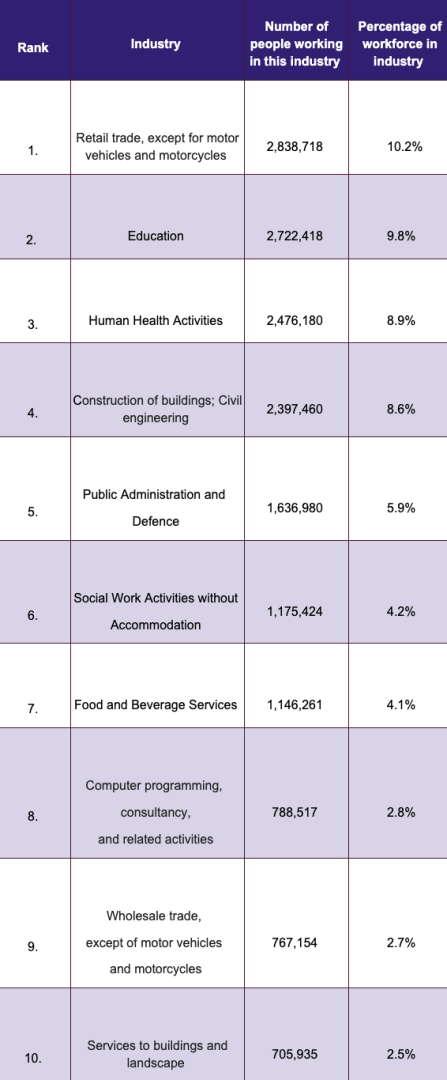Comments
- No comments found

A new study has revealed that retail trade is the industry with the highest percentage of the workforce working in.
The study, conducted by income protection experts Eleos, analysed data from the Office for National Statistics 2021 Census to reveal how much of the population is in work, and which are the most common industries to work in.
Ranking as the industry with the largest proportion of the population’s workforce is ‘Retail trade, except for motor vehicles and motorcycles.’ A whopping 2.8 million people are working in retail, making this 10.2% of the working population.
Following closely in second is the education sector with 2,722,418 people within it. In third is human health activities, with 2,476,180.
More than 28.2 million people are economically active (excluding full students), with 95.12% of people in employment and 4.87% looking for work. For those that are full-time students and economically active, they make up 2.28% of the population, with 810,345 of these people in a job.
On the other hand, 19,117,521 (39%) are economically inactive, with the most popular reason being retirement. Those who are retired makeup 54.99% of those who are economically inactive.
In contrast, only 14.33% of students aren’t looking for work, while those looking after their family and home make up 12.12%, followed closely by those long-term sick or disabled with just 10.59%.

The study also found that for those who work, over 9.5 million (9,703,900) work full-time, while just over 4 million people work part-time (4,131,967).
As well as looking at what industries people work in, the analysis also looked at the mode of transport people take to work.
45% (12,480,002) of workers say that they use their car or van to get to work, 31% say that they work mainly at home, while 4% say that they catch a bus, minibus, or coach to get to work. With just 0.4% only 127,804 are opting to use motorbikes, scooters, or mopeds for their main mode of transport.
Speaking on the findings, Kiruba Shankar Eswaran, CEO of Eleos said: “The number of economically active people is a key metric in assessing the overall economic health of a country. High levels of economic activity often correlate with a vibrant and growing economy, while low levels may indicate economic challenges.
“Person-facing roles, such as customer service, healthcare, education, and hospitality, are integral to the functioning of society. They contribute directly to the well-being and quality of life for individuals. Monitoring these roles helps identify shifts in societal needs and preferences. It also helps policymakers, businesses, and researchers identify which industries are thriving, where there may be skill shortages, and which sectors are experiencing growth or decline.”
Leave your comments
Post comment as a guest